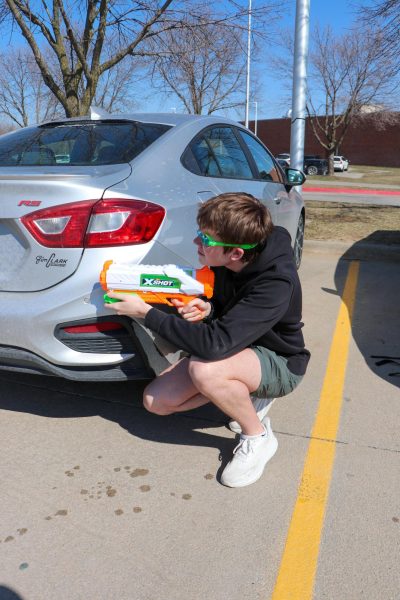Flu off the Handle
February 13, 2018
513,212 influenza tests. 83,450 positive results. 37 child deaths. All of these, reported by the CDC, add up to one of the worst flu seasons the U.S. has seen in a long time.
According to the CDC, flu season lasts from October to March and is most severe from December to March. Influenza spreads more in the winter because everyone is indoors more. People are closer together and touch more objects that have germs on them such as light switches and doorknobs.
Students and teachers are constantly around people during the school day, allowing germs to spread rapidly. When a contaminated student comes to school, they put everyone at risk by bringing their germs into the building and giving them the opportunity to spread. A simple cough or sneeze can pass the illness on to one of their peers.
“I have students come in everyday that say ‘I had a fever of 101 this morning, but I had to take a test,’ or ‘I was throwing up this morning, but I had to take a test,’” school nurse Jamie Matson said. “Because of that, they come to school and infect everybody.”
According to the Department of Health and Human Services, from Oct. 1st to Jan. 13th there have been just over 3800 positive flu tests in Nebraska, and 85% of those cases have been Influenza A. In the week of Jan. 7 alone, there were 963 positive influenza tests and 440 people were hospitalized. As of Jan. 13, there were 21 deaths in Nebraska On Tuesday, Jan. 23, the first child died from influenza in Nebraska.
The flu typically comes on very fast and lasts five to seven days. As stated by the CDC, common symptoms are a fever that lasts three to four days, chills, severe muscle aches and fatigue. It can also cause chest pain and vomiting.
“I had never felt that sick before,” sophomore Mackenzie Guinotte said. “I felt really hot because of my fever, was achy, had bad headaches and was overall just miserable. The worst part was that I couldn’t even walk 10 feet without getting nauseous.”
There is no cure for influenza, only symptomatic relief. Medications such as Ibuprofen or Tylenol can reduce the fever and relieve muscle aches. If you get to a doctor within the first 48 hours, they can put you on Tamiflu. This medication does not get rid of influenza but can reduce the symptoms or the length of time that you have the disease. It is important to stay home, rest and drink lots of fluids.
According to the CDC, among those who get the influenza vaccine, the risk of getting the flu is reduced 40-60%. The virus that goes into the vaccine is typically grown in a chicken egg. It replicates, gets purified and then a dead virus is injected into the body. The vaccine is quadrivalent, meaning it provides protection for four different strains of the flu.
The vaccine’s purpose is to prepare your body to fight the flu. Each virus has different proteins. By injecting a dead version of the virus, your body can recognize the proteins and be prepared to fight the flu. If you get the flu, but had the vaccine, the vaccine should lessen the symptoms and/or the amount of time you are sick because your body will recognise the virus’s proteins and have a better response to it.
“Older people have a weaker immune system response than younger people, so they are at a higher risk,” Nebraska Methodist Hospital doctor Andrew Coughlin said. “Getting the vaccine and having a strong response in your immune system will produce good results.”
The vaccine is not a 100% guarantee though.
The influenza virus can take on genetic changes very rapidly. The vaccine seems to protect better against Influenza B and H1N1, a strain of Influenza A. It does not protect as well against H3N2, another strain of Influenza A, because that one changes more rapidly.
Elderly people above the age of 65, children under 5 and especially those under 2, pregnant women and people with health problems such as asthma or heart disease are at especially high risk of getting the flu and having it become severe.
“It’s not a matter of how it gets worse, it’s a matter of who it hits worst,” Coughlin said. “Everybody has different immune systems.”
If you’re extremely weak, get worse after three to four days instead of better or receive no relief from general medication, you should consider going to the hospital. Clinic doctors will also tell you if you need to be hospitalized.
The main way to keep yourself healthy is to keep your hands clean. Wash your hands when you touch items in public places, after you use the restroom, and before you eat. Stay away from people who are sick, and if you are infected stay at home and rest.

















